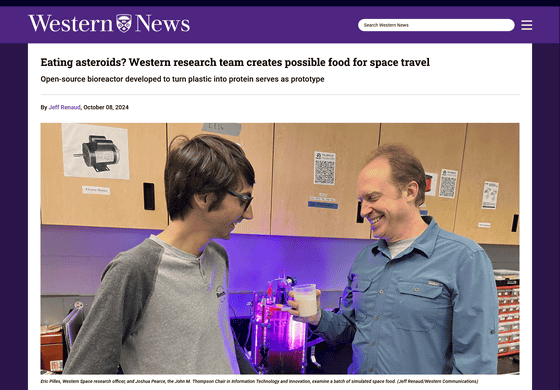The idea of producing food for space exploration from asteroids

'In order to conduct manned
How we can mine asteroids for space food | International Journal of Astrobiology | Cambridge Core
https://www.cambridge.org/core/journals/international-journal-of-astrobiology/article/how-we-can-mine-asteroids-for-space-food/9EF3C4FA6F32368D09994EB7910C7035
Western research team creates possible food for space travel
https://news.westernu.ca/2024/10/eating-asteroids/

In addition to Pires, other researchers on the study included Joshua Pearce, author of 'Feeding Everyone No Matter What,' a book about feeding the world in the wake of a major disaster, and Ian Nicklin of the Ontario Museum.
The idea of 'using asteroids as food' is based on research by Pierce, who has been working on 'extracting proteins from plastic-eating bacteria to create food.' Pires said, 'For humans to explore deep space, we need to get food from space,' and he seeks the source of that food from the carbon contained in asteroids.
Plastic is primarily made up of carbon and hydrogen, so the idea is to feed plastic-eating bacteria the carbon contained in asteroids.
The first step in making food from plastic is pyrolysis, a chemical reaction that does not require oxygen. Pyrolysis produces oil, gas, and solids. The oil is collected and fed to a bioreactor to feed the bacteria. The bacteria then become the source of food.
According to calculations, the asteroid Bennu, from which samples will be collected in 2024, has a mass of about 85.5 million tons, which is enough to provide six astronauts with food for 100 years.
Samples from asteroid Bennu arrive at JAXA Sagamihara campus! | Institute of Space and Astronautical Science
https://www.isas.jaxa.jp/topics/003800.html
To Bennu and Back: Journey's End - YouTube
Pierce is also working with Michigan Technological University on a project funded by the Defense Advanced Research Projects Agency (DARPA) to use a similar process to make food from plastic.
According to Pierce, the FDA has approved the product, and it is being tested on worms and rats. If it is successful, the company will move on to human studies. 'If it is proven safe for humans to eat, I will be the first to try it,' Pierce said.
Related Posts:







